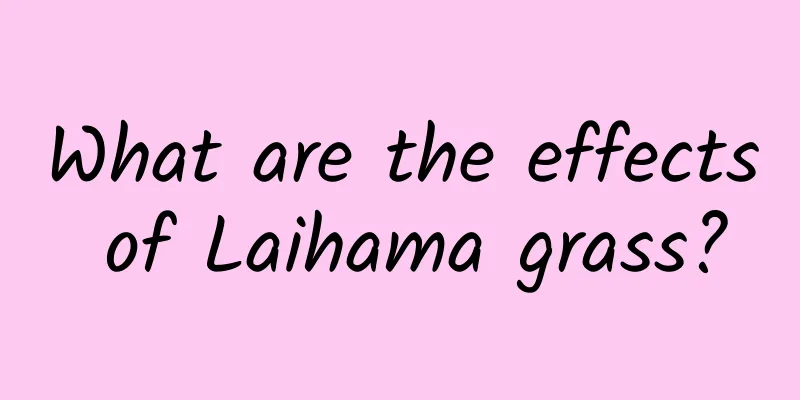The efficacy and function of purple indigo

|
Purple indigo is something that many people are very familiar with. The benefits that purple indigo brings to us are not available in other foods. So what are the effects of purple indigo? Let’s learn about it together. [Other names] Blue flower grass, red grass, ground dog gall, green vine, thorny cyathula, white cyathula, false red and blue, azalea [Source] Medicinal material source: the whole plant of Rhododendron australis of the Acanthaceae family. [Original form] False azalea is an upright thornless semi-shrub, up to 2m high. Much branched, nodes slightly swollen. Leaves are opposite; petiole is about 5mm long; leaf blade is elliptical to oblong, 3-10cm long, 1.5-4.5cm wide, with short pointed tip, gradually narrowing to short petiole at base, entire margin, and hairy on both sides. Flowers solitary in leaf axils or 4-8 flowers gathered into a short head or spike inflorescence; bracteoles linear, 5-15mm long, slightly coarsely hairy, with small sharp thorns at the tip, and usually with thorns on the edges; 4 sepals, the outer 2 sepals ovate-lanceolate, 1.2-2cm long, green, with thorny small teeth on the edges, the inner 2 sepals are very small, linear, about 6mm long, white; corolla bluish purple or nearly white, or with bluish purple and white stripes, floral tube funnel-shaped, about 6cm long, hairy on the outside, with 5 lobes on the eaves, two-lipped; 4 stamens, didynamous; disk large, ovary with 4 ovules, long style. The capsule is to be about 1.2 cm long. There are 4 seeds, which are slightly hairy and flat. The flowering period is September-December. [Habitat distribution] Ecological environment: mostly grown near villages or roadsides. It is now widely planted in tropical regions. [Properties] Identification of properties: The stem is cylindrical, slightly angular, smooth and thornless. Leaves are opposite, wrinkled, complete leaflets are elliptical to rectangular, 3-10cm long, pointed at the apex, cuneate at the base, entire, slightly wavy, and hairy on both sides. [Chemical composition] The whole plant contains α-amynn, β-sitosterol, stigmasterol-3-D-glucoside, iridoid derivatives shanzhiside methyl ester, acetylbarlerin (5,7-O-diacetylshanzhiside methyl ester); contains flavonoids: apigenin, apigenin-7-O-glucoside, naringenin and apigenin glucuronide. 【Nature and flavor】 Spicy; bitter; cool 【Functions and indications】 Clears the lungs and resolves phlegm; dispels wind and dampness; detoxifies and reduces swelling. It is used for lung heat cough, whooping cough, rheumatic pain, itchy rash, impetigo, painful urination, bruises and swellings, carbuncles, sores and boils. [Usage and Dosage] For oral use: decocted in water, 9-15g; or soaked in wine. For external use: appropriate amount, crush the fresh product and apply on the affected area; or boil it in water and wash with it. 【Excerpt】 Chinese Materia Medica Through the introduction of this article, we can learn some relevant knowledge about purple indigo. Whether from the perspective of food health or traditional Chinese medicine, the role of indigo cannot be underestimated. |
<<: The efficacy and function of Viola yedoensis
>>: The efficacy and function of purple leather ear
Recommend
[Smart Farmers] Magnolias are both beautiful and talented: they are more than just for viewing
In China, flowers bloom in May in Beijing, in Apr...
Can honeysuckle remove moisture?
Everyone knows that honeysuckle has many function...
The efficacy and function of wolf oil
Wolf oil is very familiar to everyone. It has a l...
What are the Chinese herbal medicines for treating eczema?
Eczema is a disease that becomes very common once...
Insights | Three abilities a person needs
Famous Artists Gallery | Chen Banding, also known...
How do astronauts use electricity in space?
At 9:22 on June 17, astronauts Nie Haisheng, Liu ...
Their dorsal aorta and esophagus actually "drift"?
Produced by: Science Popularization China Author:...
China's greatest connection! How many secrets does the Yangtze River hide?
On Earth There has never been such a river With s...
The efficacy and function of mountain ash
As a traditional Chinese medicine, do you know th...
Insights | The secret to staying happy: Don’t get upset or argue
Famous Artists Gallery | Henri Matisse, a famous ...
The efficacy and function of Polypody fern
Polypody fern has a long history, and up to now, ...
Many diseases can be traced back to bad habits in your life! Check yourself!
"Doctor, how did I get this disease? I'm...
The efficacy and function of Iris odorata[picture]
The development of Western medicine has brought s...
The efficacy of the traditional Chinese medicine goose does not eat grass
Traditional Chinese medicine is extensive and pro...
Are those products labeled "natural" really a waste of money?
Recently I saw a hot search "Are black sesam...









